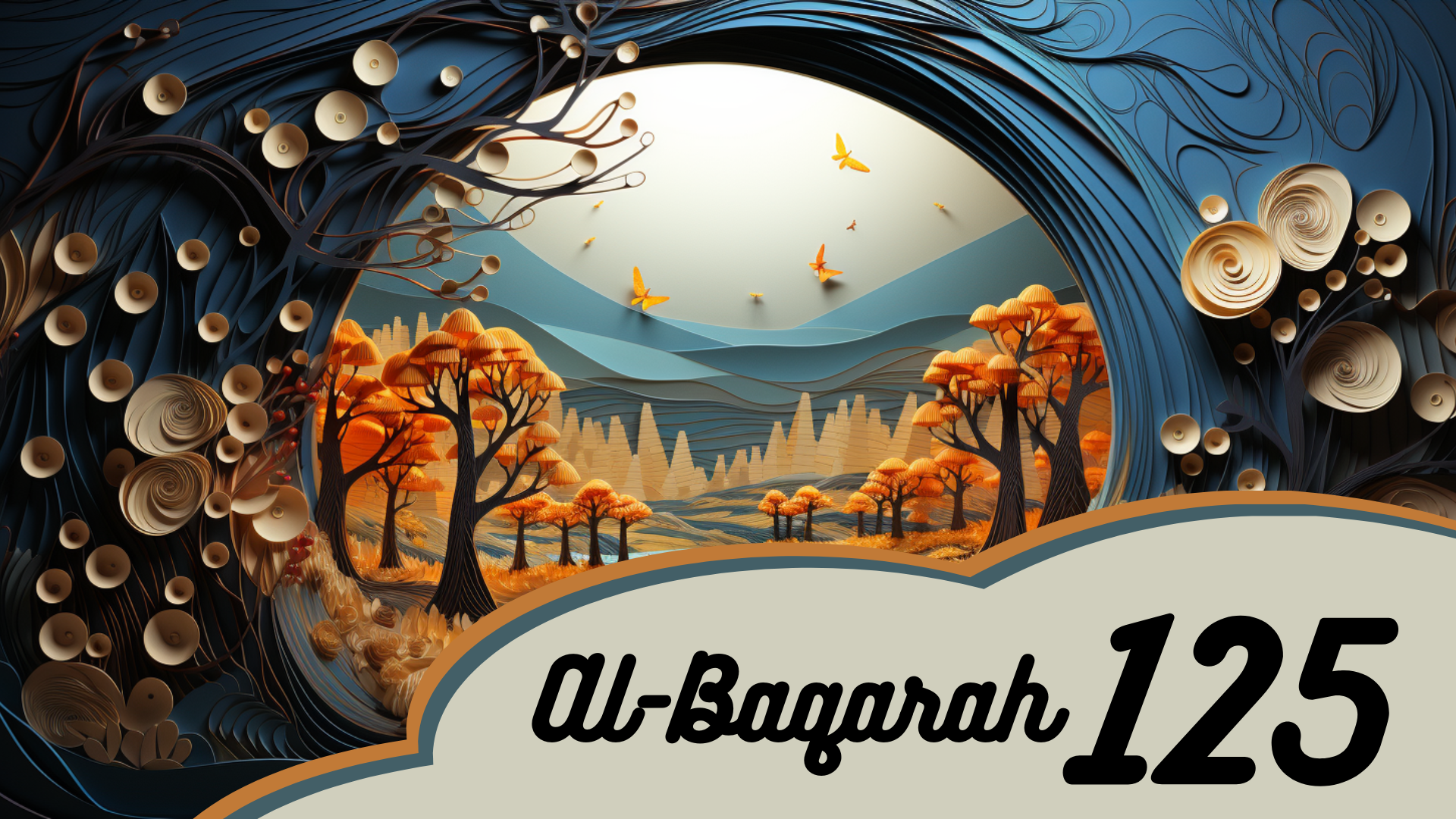In this article, we explore the profound meaning behind Verse 125 of Surah Al-Baqarah and unravel its significance in the daily lives of Muslims. By delving into the details of this verse, we aim to provide a deeper understanding of the message it conveys and how it can be applied in our everyday lives. As we examine the context and implications of this verse, we uncover the wisdom it offers, shedding light on the guidance it brings to Muslim individuals seeking to strengthen their faith and connect with their Creator.
Brief overview of Surah Al-Baqarah
Surah Al-Baqarah is the second chapter of the Holy Quran and is the longest surah in terms of verses. It consists of 286 verses and covers a wide range of topics, including guidance for personal conduct, laws and regulations, historical accounts, and stories of previous prophets. This surah is considered as one of the most important chapters of the Quran and holds great significance in the lives of Muslims around the world.
Context of Surah Al-Baqarah
Surah Al-Baqarah was revealed in Medina, after the migration of Prophet Muhammad (SAW) from Mecca. It was revealed over a period of several years and encompasses various themes and subjects. The surah addresses the challenges faced by the early Muslim community and provides guidance for building a just society and establishing principles of worship and morality.
Introduction to Verse 125
Verse 125 of Surah Al-Baqarah holds immense importance in the life of a Muslim. It highlights the significance of the Kaaba, the sacred house of worship, as the central point of unity and direction for Muslims across the globe. This verse emphasizes the obligation of Muslims to establish a connection with the Kaaba and to participate in the rituals of pilgrimage, known as Hajj. Moreover, it signifies the importance of unity within the Muslim community and the role of the Kaaba in fostering this unity.
Translation of Verse 125
The translation of verse 125 of Surah Al-Baqarah is as follows: “And [mention] when We made the House a place of return for the people and [a place of] security. And take, [O believers], from the standing place of Abraham a place of prayer. And We made a covenant with Abraham and Ishmael, [saying], “Purely and solely for Allah, let the people leave Our Sacred House (Kaaba).””
This verse highlights the purpose of the Kaaba as a center of return and security for people. It instructs believers to take the standing place of Prophet Abraham as a place of prayer and emphasizes the importance of worshipping Allah alone. The verse also mentions the covenant made with Prophet Abraham and his son Ishmael, affirming the sanctity of the Kaaba and the responsibility of believers to keep it pure and dedicated to Allah.
The Kaaba and its significance
The Kaaba holds immense significance in Islamic history and is considered the holiest site in Islam. Located in the city of Mecca, in modern-day Saudi Arabia, it is the focal point of Muslim prayers and the destination of the annual pilgrimage, Hajj. Muslims around the world face towards the Kaaba while performing their daily prayers, symbolizing their spiritual connection and unity as a community.
The Kaaba is believed to have been constructed by the Prophet Ibrahim (AS) and his son Ishmael. It is a simple cuboid structure covered in black cloth, known as the kiswa, with a golden door. The interior of the Kaaba is empty, with only a few ancient artifacts and calligraphic inscriptions adorning its walls. The structure itself does not hold any inherent divine power; rather, its significance lies in the devotion and worship it represents.
The Building of the Kaaba by Prophet Ibrahim (AS)
According to Islamic tradition, the construction of the Kaaba was initiated by the Prophet Ibrahim (AS) under the divine command of Allah. Alongside his son Ishmael, Prophet Ibrahim (AS) rebuilt the Kaaba on the foundations laid by Prophet Adam (AS). The act of constructing the Kaaba was a demonstration of unwavering faith and submission to Allah.
The construction of the Kaaba not only symbolized the obedience of Prophet Ibrahim (AS) but also marked the establishment of a central point for the worship of Allah. It represented a physical manifestation of the unity of all believers, regardless of their backgrounds, and the recognition of Allah as the ultimate focal point of worship.
The Selection of the Kaaba as the direction of prayer
During the early days of Islam, Muslims used to pray towards the direction of Jerusalem. However, Allah revealed the command to change the direction of prayer to the Kaaba in Mecca. This shift in the qibla, or the direction of prayer, was a pivotal moment for the Muslim community and solidified the Kaaba’s position as the central symbol of Muslim unity and worship.
The selection of the Kaaba as the qibla holds deep spiritual significance. It represents the unity of Muslims worldwide, regardless of their geographical location, as they all turn towards the same point during their prayers. This unification fosters a sense of community and reinforces the belief in the oneness of Allah and the shared bond among believers.
The Placement of the Kaaba as the Center of Muslim Unity
The Kaaba’s position as the central point of Muslim unity is further emphasized by its geographic location in Mecca, the birthplace of the Prophet Muhammad (SAW). Mecca holds special historical and religious significance as the city where Islam originated and where the first mosque, the Masjid al-Haram, is located.
Muslims from different parts of the world travel to Mecca to perform the Hajj pilgrimage, which includes circumambulating the Kaaba in a counterclockwise direction. This journey not only signifies devotion to Allah but also creates a strong sense of unity and solidarity among the millions of Muslims performing the rituals together.
The Spiritual Significance of the Kaaba
Beyond its physical and symbolic importance, the Kaaba holds deep spiritual significance for Muslims. It serves as a tangible representation of the divine presence and a reminder of the ultimate goal of worshiping Allah. Muslims believe that the Kaaba is the house of Allah on Earth, and by facing it during their prayers, they establish a direct connection with the Creator.
The spiritual significance of the Kaaba extends beyond the physical boundaries of the structure itself. It symbolizes the spiritual journey undertaken by every believer, with the ultimate aim of drawing closer to Allah and seeking His pleasure. The act of circumambulating the Kaaba during Hajj represents the eternal cycle of submission and devotion to Allah, leading to spiritual purification and growth.
Significance of Verse 125 in Today’s World
In today’s world, verse 125 of Surah Al-Baqarah holds immense relevance and serves as a reminder of the importance of unity and connection among Muslims. The verse emphasizes the role of the Kaaba as a central point of reference and a source of unity for Muslims worldwide.
As the ummah, or global Muslim community, faces various challenges and divisions, this verse encourages believers to come together and embrace their shared faith. It reminds Muslims of the significance of the Kaaba and the need to prioritize their spiritual connection with Allah above all else.
Furthermore, the verse emphasizes the importance of maintaining the sanctity of the Kaaba and preserving its sacredness. Muslims are reminded to uphold the values of purity and devotion when interacting with the Kaaba and to show respect and reverence for the house of Allah.
In conclusion, verse 125 of Surah Al-Baqarah serves as a reminder to Muslims of the significance of the Kaaba as the central point of unity and direction for the Muslim community. It highlights the need for Muslims to establish a strong connection with the Kaaba and to prioritize their spiritual relationship with Allah. The verse carries profound meaning and continues to guide Muslims in their daily lives, fostering a sense of unity, devotion, and reverence for the Kaaba as a symbol of their faith.




